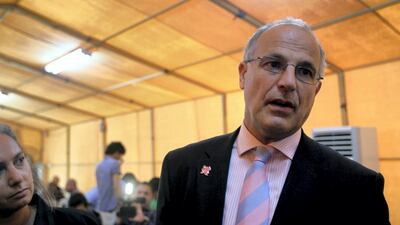Only a few weeks into the job as British ambassador to Yemen, Michael Aron was in Abu Dhabi meeting leaders and businessmen from the war-torn state when he received an abrupt notification of the challenge facing the region.
Houthi rebels had targeted Riyadh with an Iranian missile that detonated in a residential neighbourhood, killing an unsuspecting Egyptian resident. Instantly Mr Aron’s phone was alive with developments. “The team WhatsApp on the ground was filled with messages within minutes, it was a very audible bang and quite alarming,” Mr Aron told The National.
The series of missile attacks on Yemen’s northern neighbour is one development in recent months that has brought the situation to a critical juncture. The others being the death of former president Ali Abdullah Saleh and the appointment of Mr Aron’s fellow Briton Martin Griffiths as the UN Secretary General’s envoy for peace talks.
Houthi rebels fired the missiles but they were supplied from elsewhere. Establishing the missiles as Iranian made has shown up the depth of Tehran’s intervention on the southern tip of the Arabian peninsula. Allying with Abdul-Malik al Houthi’s followers, Iran's regional campaign targeting Saudi Arabia has undergone unrelenting expansion.
“Missiles aimed at Riyadh – and shorter range attacks on Jizan – and the attacks on the Red Sea are all demonstrating by the Houthis ‘we’re here, we’re not going anywhere, we have backers, we can get weapons,” Mr Aron, a former ambassador in Kuwait, Iraq, Libya and Sudan observed. “We see [also] the issue around the provenance of the missiles, which according to an independent panel of experts come from Iran and we would certainly agree with that, as a demonstration of Iranian interference.
“There is a whole element around the role of Iran which has grown significantly over the last 10 years in Yemen. Its part of a broader Iranian regional effort – Yemen is not a strategic interest of Iran – it’s a means of getting at the Saudis.”
With a fresh set of eyes to the conflict, Mr Aron makes a strong case that a resolution must revolve around those regional security concerns. “We think the Saudis have every right to say that it should stop,” he said. “Over the course of the war, the Houthis as Hizbollah dynamic has grown. There is clearly Hizbollah presence on the ground and Abdul Malik al-Houthi sees Hizbollah as a role model.”
Following a set of visits to Sanaa by senior diplomats and Mr Griffiths, Mr Aron believes conditions are ripening for a diplomatic breakthrough. He foresees a prospect of success for a three-phased peace process.
Following the assassination of Mr Saleh, the former ruling party, the General People’s Congress is reassessing its role and the Houthi leadership is no longer as certain in its outlook. “The Houthis are finding it pretty tough. The impression from the various ambassadors that went in seemed to think it looked pretty fragile in Sanaa,” he said.
Acceptance of the new envoy, a veteran of peace brokering initiatives in Asia, Africa and the Middle East, has been universal. Mr Aron revealed that Mr Griffiths had already been involved in informal talks since last year. “The Houthis seem to accept him, the Saudis accept him, the government of Yemen accept him,” he said. “Broad acceptance plus 3 years of war sets the mood. What do anniversaries mean? People do notice.”
Mr Aron hopes initial confidence-building measures, such as reopening Sanaa airport and starting to pay civil servant salaries through the revitalised central bank, can kickstart Mr Griffiths efforts. Then, he believes, the fighting must be brought to a standstill before a third phase of inclusive political dialogue to restore the state.
There are already signs that some of the Yemen logjam is breaking down. A donor conference in Geneva earlier this week garnered $2 billion of the overall $3 billion appeal. Half came from Saudi Arabia and United Arab Emirates and $240m from Britain. A partnership between Mr Griffiths and Lise Grande, the UN humanitarian co-ordinator, can now work to bring relief and deliver political benefits.
To uphold the UN arms embargo, a Verification and Inspection Mechanism (UNVIM) has finally been upgraded in Djibouti to screen cargo destined for Yemen.
Mohammed Al Jabir, the Saudi Ambassador to Yemen, separately said Thursday that UNVIM inspector numbers would rise to 10 from four and monitors increase to 16 from six. All would benefit from substantially improved technology.
With the increase in resources and increased access for humanitarian shipments, prevention efforts in the face of a cholera outbreak must now show dramatic improvements. “There is a massive expectation,” said Mr Aron. “There is pent-up emotion and pressure – the feeling is that Yemen can’t wait.”
In parallel a strong diplomatic commitment to the security concerns of the region has been spearheaded within the so-called Quad countries, US, UK, UAE and Saudi, adds Aron. “We are not neutral in this. We support the Coalition as we supported the initial action to prevent the Houthis taking over the country,” he said. “We worked to get the resolution 2016 adopted, so we are absolutely with the coalition in all those aspects and we now think the time has come for a political solution.
“The Saudis and Emirates need the reassurance that they have our strong support and that we are there to help them secure their reasonable security objectives.”


